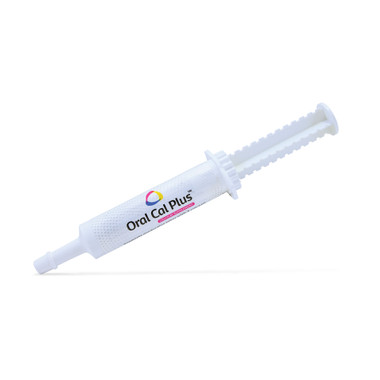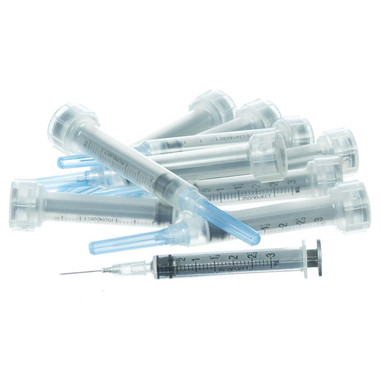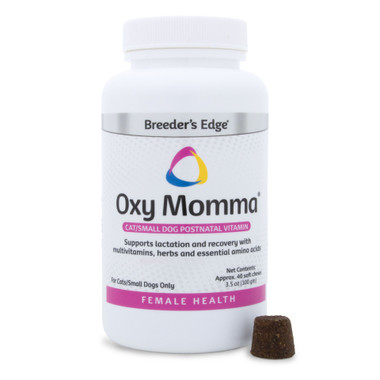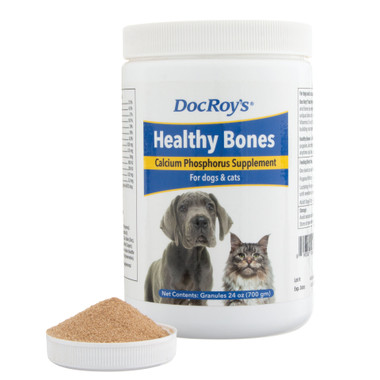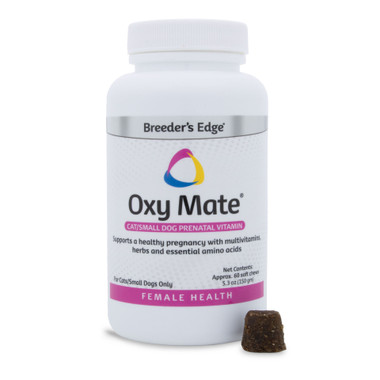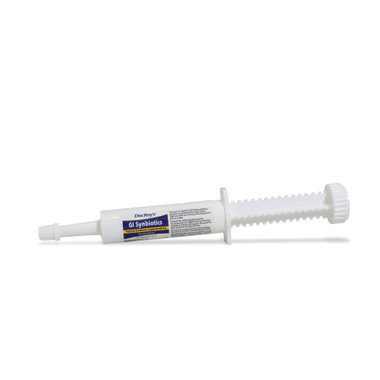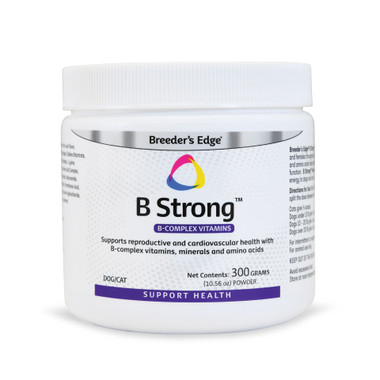How your dog’s gut (microbiome) is affecting his immune system - and what to do about it!
Estimated 0 min read

Read how to support your dog’s gut health.
Do you ever get a gut feeling about something? Like something deep inside of you just gives a signal to your brain that something is… off?
Well, you’re not being superstitious. A growing body of research over the past decade has shown increasing evidence that there is a link between our belly and brain.
But, of course, this begs the question: what about our furry friends? Are their brains similarly affected by what their stomach is telling them? (besides..that they’re hungry)? Even more importantly, what other health benefits could our pets realize if we just helped them improve their gut health?
In this short blog, we’re going to discuss what a dog’s microbiome is, what the gut-brain axis is in dogs, and how to support your dog’s gut health. Well, without further ado, let’s get into it!
Quick facts about dog’s gut health
- Dogs have an extensive gut microbiome that relates not only to their mental health, but also to the health of their immune system
- A number of unfortunate maladies have links to poor gut health in our dogs, including leaky gut syndrome, IBD, and gastritis
- A healthy, balanced diet, as well as nutritional and natural supplements, can all help to boost your dog’s gut health and strengthen his/her immune system
What is a dog gut microbiome?
The microbiome refers to the extensive collection of bacteria, fungi, and viral organisms that live within the bodies of all living organisms, including dogs and humans. While everybody’s microbiome is unique, just like a fingerprint, animals within the same species have many similarities. The greater the diversity of the microbiome, the healthier the animal or person is likely to be.
The gut microbiome is important for various physiological functions, including nutrient absorption, immune system regulation, and metabolism. In fact, studies have shown that imbalances in the gut microbiome can lead to various health problems, such as gastrointestinal issues, skin problems, and even behavioral issues in dogs.
What is the gut-brain axis in dogs?

Microbiota in the gut.
It turns out that the trillions of microorganisms that live in their gut, called gut microbiota, also play an important role in this communication. This is the gut-brain axis, which is the way that dogs’ brains and intestines communicate information with each other.
Scientists have found that the connection between gut microbiota and the GBA works both ways. Signals can travel from the gut microbiota to the brain, and from the brain to the gut microbiota. This happens through a variety of different pathways, including neural, endocrine, immune, and humoral links.
Neural Links
The connection between the central nervous system and the enteric nervous system, which is like the digestive system’s own nervous system, is established through the Vagus nerve. The vagus nerve is responsible for various functions in different parts of the body. For example, in the neck, it helps with swallowing and vocalization. And in the thorax, it helps to reduce heart rate after a stressful event. It also regulates smooth muscle contraction and secretory functions in the intestine, that is a crucial part of the digestive system.
Interestingly, vagotomy has shown some common side effects in humans, such as interference with gastric emptying, increased or dysfunctional bowel movements and nutrient malabsorption. These side effects have helped researchers understand the crucial role of the vagus nerve in animals’ digestive function, and how it impacts their gut-brain axis.
In the small and large intestine of dogs, there are nerve endings called vagal afferents that can sense how much food is in the gut. It can also detect chemicals that are being absorbed. Certain bacteria in the gut can then produce metabolites and neurotransmitters which impact these nerve endings. This is fascinating because we have discovered that by supplementing with certain bacteria, we can actually alter the activity of the vagus nerve.
Remarkably, massage is also becoming a popular way to modulate vagus nerve function in dogs. By changing the population of bacteria in the gut and using massage techniques, we can support the digestive and mental health of our furry friends.
Endocrine Links
Scientists are increasingly discovering that the gut is not just for digestion, but it also acts like a hormone factory. In fact, some of the hormones made by the gut microbiota are also used by the central nervous system, which controls important body functions. For example, certain bacteria can produce a neurotransmitter called GABA, which helps regulate brain activity and reduce anxiety.
We also need to consider the HPA axis, which is the main system that responds to stress. This system links our perception of stress to our physical reactions. Studies on germ-free animals (animals with no gut microbiota) have helped researchers understand the gut-brain connection. Germ-free animals have trouble responding to stress, but when given gut bacteria from specific pathogen-free sources, they become better at handling stress. Researchers have concluded that the types of microorganisms living in the gut during early life are critical for the proper development of the HPA axis.
Immune Links
Current studies have shown that the gut microbiota (the collection of microorganisms living in the digestive system) play an important role in brain development and function through the gut-brain axis. This interaction is coordinated by the immune system.
Research using germ-free animals has demonstrated that the gut microbiota is important for proper maturation of the immune system and immune regulation, within the central nervous system. Findings have also shown that the absence of gut microbiota in germ-free animals leads to immature immune cell populations in the brain. Additionally, intestinal bacteria can be of benefit by regulating the production of new brain cells.
Inflammation during the perinatal period and neonatal exposure to a high pathogenic load in the gut have been associated with abnormal brain development and memory impairment. Long-term illnesses and chronic intestinal inflammation have also been linked to behavioral disturbances. Examples of such are cognitive impairment, deficits in learning, impaired memory, depression, and anxiety.
How does a dog’s gut-brain axis affect their behavior?
The gut-brain axis refers to the connection between the gut and the brain through the production of chemicals and hormones by gut bacteria. In particular, the gut produces chemicals such as serotonin, dopamine, and GABA that are essential to the function of the nervous system and brain.
- Serotonin has a significant impact on mood and anxiety and is often referred to as the “happy chemical” because it contributes to emotional well-being. Low levels of serotonin have been linked to depression. Approximately 70% of serotonin is produced in the gut.
- Dopamine plays a vital role in motor function, mood, decision-making, and hormone regulation. Roughly 50% of dopamine is produced by enteric neurons and intestinal cells in the gastrointestinal tract.
- GABA, which helps regulate stress, anxiety, and sleep patterns, is also modulated by bacteria in the gut microbiome.
Recent feedback has shown that gut bacteria can send chemical messages to the brain, affecting mood and other behavioral traits. Different bacterial species in the gut produce various chemicals, with some calming and others potentially promoting anxiety or depression.
A groundbreaking study conducted at the University of Oregon linked aggressive behavior in dogs with gut microbiota. The study analyzed a population of rescued dogs and found the gut microbiome may contribute to aggression. Manipulation of the microbiome through probiotics or dietary changes may also modify behavior.
Another study evaluated the gut microbiome and adrenal gland activity in dogs with aggression and fear-related behavioral issues. The study suggested that probiotic interventions could restore balance and mitigate behavioral disorders. The researchers also found that long-term stress scenarios could influence gut microbiome composition. Further research is needed to establish the precise cause-and-effect relationships between canine behavioral disorders and the gut microbiome.
What conditions are linked to bad dog gut health?
Leaky gut syndrome

Different conditions lead to bad gut health.
This happens when the gut lining becomes more permeable, allowing unwanted substances to pass through such as bacteria, food molecules, and toxins. Damage to the intestines, severe infections, poor diet, exposure to toxins, or overmedication can all cause leaky gut. Symptoms of leaky gut in dogs include gas, bloating, vomiting, and diarrhea. It can be tough to diagnose, but your vet can carry out tests such as stool tests, x-rays, and blood tests. Treatment involves repairing the intestinal lining by providing a protein-rich diet, like collagen, and reducing inflammation.
Inflammatory bowel disease
IBD is a condition where a dog’s gut is chronically inflamed and irritated. The two most common causes of IBD are allergic reactions and severe bacterial or parasitic infection. IBD can lead to symptoms like diarrhea, vomiting, loss of appetite, and weight loss. Your vet may diagnose IBD with blood tests, ultrasounds, fecal tests, and possibly a biopsy. Although there is no known cure for IBD, it can be managed through diet, medication, and other therapies such as deworming and supplementation.
Anal sac issues
The anal sac is a gland found on either side of a dog’s anus, which releases a fluid that acts as a marker for sex, age, and state of health. When the anal sac becomes infected or inflamed, it can get blocked, causing pain for the dog when passing feces. Treatment involves clearing the ducts of any material blocking them and administering antibiotics if there is an infection.
Gastritis
This is a condition of inflammation of the stomach, usually caused by a dog eating something harmful or a disease affecting the stomach’s well-being. Common causes include eating food with bacteria or parasites, stomach cancer, ulcers, and IBD. Symptoms usually include digestive symptoms like diarrhea, vomiting, and blood in the stool. Treatment involves removing the underlying cause if it’s an external factor like bacteria. If it’s caused by an internal disease, treating that disease should resolve stomach inflammation.
Enteritis
This is also known as gastroenteritis, and its chronic inflammation of the small intestinal tract. It can be caused by an external or internal factor. Enteritis can reduce the production of digestive enzymes and nutrient absorption in the small intestine. Treatment involves addressing the underlying causes of inflammation.
How to support and heal your dog’s gut microbiome (and their immune system)
When it comes to keeping your dog or cat healthy, taking care of their gut health is key to boosting their immune system. Here are some ways you can support your pet’s gut health and minimize their exposure to things that can harm their immune system:
Feed them a balanced, pro-immunity diet

Feed your dog a balanced diet.
According to Dr. Susan Wynn, a veterinary specialist at BluePearl Veterinary Partners hospital in Sandy Springs, Georgia, your dog’s diet plays a vital role in maintaining a healthy immune system. Dr. Wynn explains that the gut houses a large percentage of the immune system and is also home to the microbiome, a diverse collection of bacterial species that are heavily influenced by the diet.
However, commercial dry foods can be problematic, as they often contain a high percentage of starch that can cause inflammation. According to Coger, dogs are biologically designed to consume a moist, meat-based diet, and starches should be avoided whenever possible. Coger suggests incorporating fresh meat and vegetables into your dog’s diet and avoiding starchy grains in favor of vegetable and legume starches like potatoes, sweet potatoes, and lentils.
Dr. Wynn stresses the importance of including good fiber and live bacteria from fresh foods in your dog’s diet to maintain a healthy microbiome. While many raw diets that only contain meat and bone may not be optimal, the best diet for your dog will depend on their individual needs. Therefore, it is essential to consult with your veterinarian to determine the best diet for your furry friend, as nutrition is not a one-size-fits-all solution. Your veterinarian can evaluate your dog’s unique requirements and modify the guidelines accordingly.
Offer your dog probiotics to boost their gut health and immune system
Probiotics have become increasingly popular as a way to promote good health in dogs, since they help regulate the conditions in the intestines by limiting the growth of harmful bacteria. This is because helpful bacteria compete for the same nutrients and resources as bad bacteria, reducing their numbers. By normalizing conditions in the digestive system, probiotics also provide a great boost to dogs’ immune systems.
Recent findings have shown that probiotics can also have a positive impact on a dog’s mental health as well. One particular bacterium, Bifidobacterium longum (BL999), has been found to reduce distressful behaviors such as barking, jumping, spinning, or pacing, and increase the likelihood of dogs exploring new environments.
Probiotics are available as nutritional supplements, with yogurt being the most well-known source of live cultures. When purchasing probiotics, look for labels that indicate the expiration date, precise species, number of microorganisms, and a guarantee for the number of live organisms. It’s also best to choose products that have been tested by external, accredited researchers.
Most dogs readily eat probiotics when they’re added to their food. But if your dog is picky, capsules can be disguised in treats. Probiotics can be given proactively, especially before stressful events like boarding or moving, or as part of your dog’s long-term health care.
While probiotics are safe for dogs, severely immunocompromised dogs should be given probiotics with caution and under veterinary supervision. This is because their immune systems may not be able to handle the strain of any bacterial load, regardless of its pathogenicity.
Stimulate the growth of healthy gut bacteria by offering your dog prebiotics
Prebiotics are a type of dietary fiber found in certain foods, such as fruits, vegetables, and grains, that cannot be digested by the small intestine. Once administered, prebiotics induce a fermentation process which creates short-chain fatty acids (SCFAs).
SCFAs stimulate the growth of beneficial bacteria, particularly bifidobacteria and lactobacilli. They produce substances that help protect against pathogens, stimulate the immune system, and reduce inflammation in the gut. They also improve the integrity of the gut barrier, which prevents harmful substances from entering the bloodstream.
Prebiotics have a significant impact on a dog’s immune system. They increase the production of secretory immunoglobulin A (sIgA). This is an antibody that protects mucosal surfaces of the body, including the respiratory, digestive, and urinary tracts. SIgA works by binding to and neutralizing pathogens before they can cause an infection.
Prebiotics also help regulate the balance of pro-inflammatory and anti-inflammatory cytokines in the body. Cytokines are signaling molecules produced by immune cells that regulate immune responses. Prebiotics promote the production of anti-inflammatory cytokines and suppress the production of pro-inflammatory cytokines, promoting a balanced immune response. This is particularly important in dogs with immune-mediated disorders such as allergies, inflammatory bowel disease, and autoimmune diseases.
There are different types of prebiotics available, such as fructooligosaccharides (FOS), inulin, and galactooligosaccharides (GOS). Each have unique properties and benefits. Note: prebiotics work best when they are combined with probiotics. This creates a more significant impact on gut health than either supplement alone. Regardless of which prebiotics you’re looking at, remember to consult your veterinarian. This ensures your dog receives the best prebiotics for their needs.
Consider supplementing your dog’s diet with mushrooms

Mushrooms can boots dog immune system.
Supplementing a dog’s diet with mushrooms has become increasingly popular. Pet owners are looking for natural ways to boost their dogs’ immune systems. Among the most commonly used mushrooms are reishi, shiitake, maitake, cordyceps, and lion’s mane mushrooms.
Each type of these mushrooms contains high levels of beta-glucans, polysaccharides, and triterpenes. These stimulate the production of white blood cells and improve the body’s immune response. Additionally, mushrooms also have anti-inflammatory properties that can help reduce the risk of chronic diseases like cancer and heart disease.
When it comes to supplementing a dog’s diet with mushrooms, it’s important to choose high-quality products from reputable sources. Mushrooms can be given to dogs in various forms, including fresh, dried, and powdered. However, it’s important to follow the recommended dosage instructions to avoid over-supplementation, which can lead to adverse effects.
Maximize your dog’s gut health (and strength of their immune system) with digestive enzymes
Digestive enzymes are crucial for dogs’ gut health and play a critical role in maintaining a strong immune system. These enzymes assist in breaking down food into more manageable components that can be absorbed and used by the body. This helps promote healthy gut bacteria and reduce inflammation, which, in turn, can boost the immune system. Proteases, lipases, and amylases are the three types of digestive enzymes that are especially important for dogs.
Proteases, also known as proteolytic enzymes, break down proteins into smaller peptides and amino acids. When a dog consumes protein, proteases cleave the peptide bonds holding the protein together. This allows the amino acids to be absorbed and used for building new tissue and supporting the immune system. Proteases have been found to have anti-inflammatory and immunomodulatory effects, in addition to their digestive role.
Lipases are enzymes that break down fats into fatty acids and glycerol. When a dog consumes fat, lipases hydrolyze the ester bonds holding the fat molecules together. This enables the fatty acids and glycerol to be absorbed and used for energy production and hormone synthesis. Fatty acids also play a vital role in immune system function, having been shown to have anti-inflammatory and immunomodulatory effects.
Amylases are enzymes that break down carbohydrates into simpler sugars that can be quickly absorbed by the body. When a dog consumes carbohydrates, amylases cleave the glycosidic bonds holding the carbohydrate molecules together. This enables the simple sugars to be absorbed and used by the body for energy production and glycogen synthesis. Carbohydrates also help to regulate inflammation and provide a source of energy for immune cells.
Banixx Dog Blog
Phew. Okay, we know that was a lot of information. However, we hope that this blog helps give you the information you need to improve your dog’s gut health and, as a result, boost their immune system. For more information about how to keep your dog happy and healthy, be sure to revisit our blog here at Banixx in the near future! For a breather, you may find a lighter topic such ashow long can my dog go without peeingorhow to take a road trip with your dog?
Sources:
https://www.vet.cornell.edu/departments-centers-and-institutes/riney-canine-health-center/health-info/diets-boost-immunity
https://www.akcpetinsurance.com/blog/improve-your-dogs-gut-health
https://www.frontiersin.org/articles/10.3389/fvets.2019.00498/full






